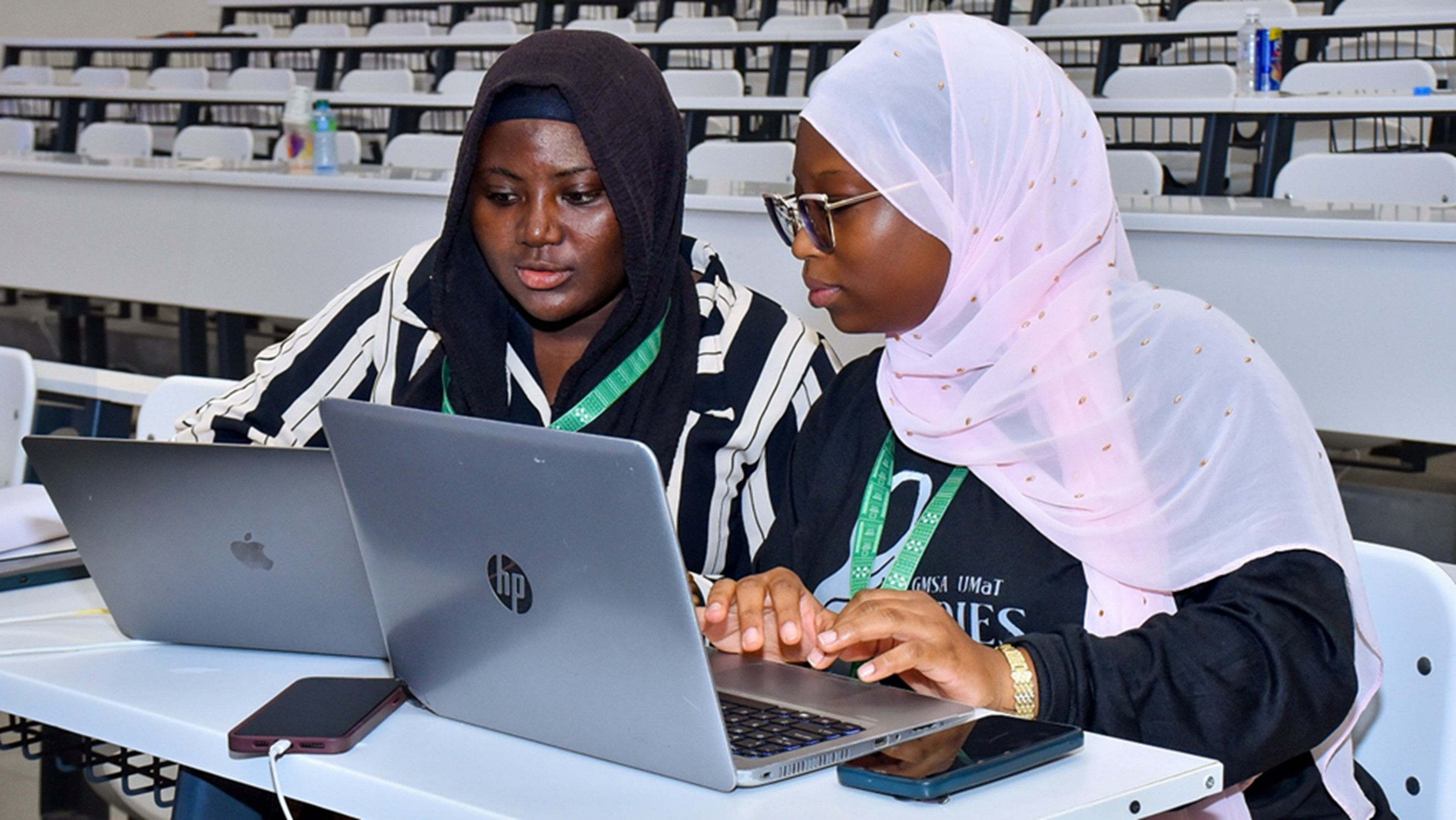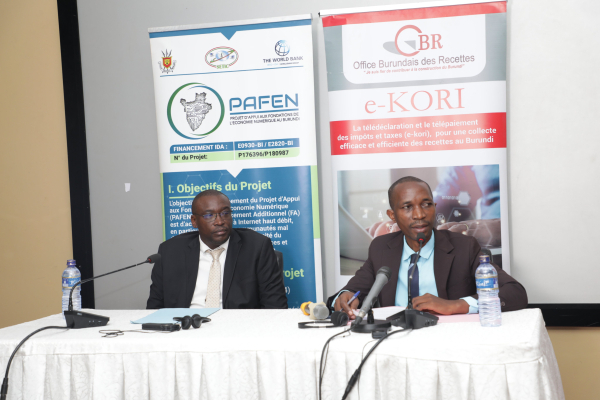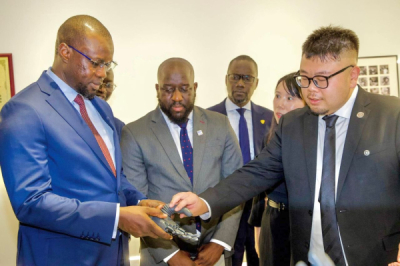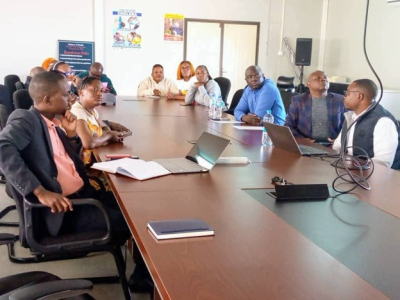• Burundi deepens collaboration with Liberia, Sierra Leone, and Benin on tax digitalization
• OBR targets simplified tax processes, better data management, and online platforms
• National rollout of electronic billing and integrated tax systems underway
Burundi’s tax authority (OBR) is accelerating its digital modernization efforts by learning from other African countries. Late last week, the OBR hosted two days of discussions with Sierra Leone’s National Revenue Authority (NRA), known for successfully implementing a digital tax collection system.
This initiative follows a similar exchange organized about a week earlier with Liberia’s Revenue Authority (LRA). Over two days, LRA experts shared their experience with Burundi’s e-KORI project, which focuses on the digitalization of internal tax collection. OBR praised Liberia’s success in building an effective digital tax system following years of civil conflict. The OBR also confirmed ongoing cooperation with Benin on similar reforms.
Burundi’s digital tax strategy aims to simplify processes for taxpayers, automate revenue management and collection, and improve data reliability. One of the most notable milestones so far has been the launch of an online filing and payment platform in 2023. The OBR website also provides services such as anonymous reporting of corruption, document verification, and access to regulatory information.
The government is now working on implementing an integrated digital system for managing internal taxes and non-tax revenues. A tender for this project was launched on May 5. At the same time, the OBR is stepping up efforts to promote the use of electronic billing machines among taxpayers.
The OBR’s digital transformation plan aligns with international standards. The Organisation for Economic Co-operation and Development (OECD) emphasizes that digitalizing tax administrations reduces the cost and complexity of paying taxes. “When the process is tedious, it creates significant time and financial costs for taxpayers. At the macro level, this can lead to major productivity and resource losses,” says the OECD.
However, the OBR recognizes that technology alone is not enough. The authority highlights the need for a clear and consistent tax framework, stronger public awareness of tax compliance, and improved monitoring of how taxpayers use digital tools such as billing machines and online platforms.
Beyond digital systems, access to technology remains a critical challenge. For example, according to the International Telecommunication Union (ITU), nearly 90% of Namibians did not use the Internet in 2023, and around 80% of the population lacked mobile phones.
The OBR believes improving access to digital infrastructure will be key to ensuring that taxpayers across Burundi can fully benefit from its digital tax services.
He blends traditional practices with innovative approaches in Uganda. He designs initiatives centered on livestock farming, deploying systems that boost income growth and transform the methods used by the country’s herders.
Nicholas Katongole (photo), a Ugandan entrepreneur, is committed to modernizing livestock farming in Africa. As CEO of NOA’S HERD, a startup he founded in 2022, Katongole is developing digital tools to make livestock a sustainable source of income for small-scale African producers.
NOA’S HERD offers farmers a digital platform that collects, analyzes, and certifies methane emissions data from livestock. The company uses connected sensors installed on farms to track emissions in real time, enabling precise and transparent monitoring. This data then generates verified carbon credits that can be traded on international markets.
The platform also automates contract management, farmer payments, and certification of sustainable practices. It provides a comprehensive solution that remains accessible even to farmers unfamiliar with digital tools.
"Our mission is to use cutting-edge technology and specialized natural feed supplements to help African farmers lower methane emissions, boost productivity, earn carbon credits and create a more sustainable livestock sector that supports global climate goals," the startup explained.
In 2024, NOA’S HERD partnered with Australian firm Sea Forest, known for its seaweed-based supplements. The agreement enables the distribution of SeaFeed, a feed additive that can reduce ruminant methane emissions by up to 90%. The first phase targets 30,000 cattle across 15 farms in Uganda and Kenya.
Katongole also serves as Business Development Lead at Quality Chemicals Ltd, a provider of scientific solutions in human and animal health, public health, and crop protection.
Before launching NOA’S HERD, he co-founded Home Duuka in 2012, one of Uganda’s first e-commerce platforms. From 2017 to 2024, he was director at Vero Food Industries Ltd, a company specializing in the production and distribution of quality food and beverages.
By Melchior Koba,
Editing by Sèna D. B. de Sodji
• PM Sonko in China to boost Senegal's tech sector.
• Key talks on 5G, AI, fiber, and start-up support.
• Deals eyed for Dakar 2026 and digital sovereignty.
Senegalese Prime Minister Ousmane Sonko (photo, left) began an official visit to China on Sunday, June 22. He was accompanied by a high-level delegation, including Alioune Sall, Minister of Communication, Telecommunications, and Digital Affairs. The mission aims to strengthen technological partnerships with Beijing and accelerate Senegal’s digital transformation.
In Hangzhou, a key Chinese innovation hub, the Senegalese delegation met with major companies. These included Alibaba Group, BrainCo, a brain-machine interface specialist, and CHINT, a leader in smart energy solutions. Discussions focused on critical areas. These included the development of essential digital infrastructure, such as fiber optics, 5G, and artificial intelligence. Talks also covered mechanisms for skills transfer and support for Senegal’s startup ecosystem. This support would come through targeted investments, technical training, and academic cooperation.
The visit follows a series of strengthened bilateral ties in recent years. In 2023, Dakar and Beijing launched joint projects to digitize Senegal’s road transport system. As part of its national "Technological New Deal" strategy, the Senegalese government aims to make digital innovation a cornerstone of its technological sovereignty and inclusive growth. For its part, China continues to expand its presence in West Africa through structural partnerships in key sectors.
If this mission leads to new agreements, it could pave the way for major strategic partnerships. This is particularly relevant ahead of the 2026 Youth Olympic Games in Dakar, for which Alibaba Cloud is being considered as a potential technology partner. Beyond that event, this cooperation could play a decisive role in building a strong Senegalese digital ecosystem. Such an ecosystem would be capable of generating skilled jobs and reinforcing the country’s technological autonomy in the face of 21st-century challenges.
By Samira Njoya,
Editing by Sèna D. B. de Sodji
The digital system will improve service delivery through more streamlined processes, increase transparency and accountability in record-keeping, and accelerate the shift from paper-based systems to modern digital infrastructure.
The e-Government Division of SMART Zambia Institute announced on June 20 that it is currently demonstrating its new SMART Office Management System at the Ministry of Health Headquarters. This marks a significant step in the government’s broader strategy to digitize public services and reduce reliance on paper-based operations.
Mr. Goodson Kamanga, Assistant Director for Administration at the Ministry of Health, expressed strong support for the system. He described it as a game-changer for the registry department, which manages vast amounts of data and documentation.
Developed by the Electronic Government Division (SMART Zambia Institute), the SMART Office Management System aims to enable fully functional electronic registries across all levels of government, beginning with the Ministry of Health. The system is designed to streamline document handling and record management from provincial to district levels, creating a centralized digital environment for efficient service delivery.
Mr. Gilcent Mwanakwampwe, Service Support Officer at SMART Zambia Institute, explained that Luapula Province has been selected as the pilot location due to its existing Government Wide Area Network (GWAN) infrastructure in most institutions. The demonstration highlights the solution’s scalability, with plans to expand its rollout to the Public Service Management Division (PSMD), the Ministries of Finance and Education, the National Archives, and several government commissions.
The SMART Office Solution is a key component of Zambia’s digital transformation agenda. It is expected to significantly reduce operational costs, with the government estimating savings of approximately K400 million annually in stationery expenses. Beyond cost savings, the system also addresses long-standing issues such as missing files, misclassification of records, and limited access to critical data.
The move aligns with the World Bank’s recommended priority actions for Zambia’s digital transformation, particularly the call to strengthen the institutional capacity of the government to protect consumers, safeguard data, and secure critical digital infrastructure.
By digitizing public services through initiatives like the SMART Office Management System Zambia is laying the groundwork for a more secure, efficient, and citizen-centric digital ecosystem. These efforts not only aim to improve service delivery and reduce costs, but also support the broader goals of building trust in e-government platforms, enhancing transparency, and ensuring long-term resilience in the face of emerging digital risks.
Hikmatu Bilali
This startup aims to simplify money transfers between Nigeria and the rest of the African continent. Its founder has raised initial funds for this goal with support from friends and family.
Hizo, a Nigerian fintech startup, has developed a solution to enable quick money transfers across several African countries using a mobile wallet. Founded in 2024 by Victor Chiedu and based in Asaba, the company raised $100,000 in seed funding in June 2025 to scale its technology and accelerate growth.
"Cross-border transactions within Africa are typically routed through foreign currencies like the U.S. dollar, which drives up cost and complexity," Chiedu said. "We're building a platform by Africans, for Africans, a system that supports local currencies across borders without foreign intermediaries."
The Hizo solution is available via a mobile app on iOS and Android, where it has already seen over a thousand downloads, according to Play Store statistics. Users can set up accounts by providing basic information and completing Know Your Customer (KYC) checks. Once registered, they can send and receive money from friends, family, or clients through their digital wallet.
Nigerian users can fund their Hizo wallets using local bank cards or through Flutterwave. They can then transfer money to bank accounts or mobile wallets in countries such as Ghana, Kenya, Cameroon, and South Africa. The process is designed to be simple, secure, and fast, with active customer support available to assist with any issues.
Hizo is positioning itself in the intra-African remittance market, targeting individuals, merchants, and regional diasporas seeking to send money without relying on traditional channels, which are often slow and costly. Currently in its pilot phase, the fintech expects significant growth in the coming months.
By Adoni Conrad Quenum,
Editing by Feriol Bewa
Artificial intelligence is steadily becoming a transformative tool for African public services. Although local solutions are emerging in health, education, and agriculture, their widespread adoption hinges on significant structural investments and a clear ethical framework.
Africa is increasingly adopting artificial intelligence to modernize its public services, particularly in strategic sectors like health, agriculture, and education. According to "Governing in the Age of AI – Unlocking a New Era of Transformation in Africa," a report published in April 2025 by the Tony Blair Institute, AI can boost state productivity, enhance transparency, and improve access to essential services at a lower cost. Africa currently accounts for only 1% of global AI investment but could significantly benefit from a targeted approach based on concrete use cases tailored to local realities.
Health: Low-Cost Diagnostics and Smart Logistics
AI applications are expanding across Africa's health sector. In Nigeria, the startup Ubenwa developed an algorithm that analyzes newborn cries to detect early signs of asphyxia. This helps reduce neonatal mortality in rural areas. In Nairobi, Neural Labs is testing NeuralSight, an AI-based medical imaging analysis platform capable of diagnosing over 20 respiratory and breast diseases at a lower cost.
Agriculture: Boosting Productivity for Smallholder Farmers
African agritech companies are rapidly adopting AI to transform farming practices. South Africa's Aerobotics uses drones and satellite imagery to detect diseases and pests before they spread, contributing to higher yields. In Ghana, Farmerline launched Darli, a chatbot accessible via WhatsApp in 27 African languages, providing tailored agricultural advice. Launched in March 2024, the service already reaches 110,000 farmers. These innovations improve access to agricultural expertise, help reduce input use, and strengthen climate resilience.
Education: Personalized Support to Address Teacher Shortages
With UNESCO estimating a teacher shortfall of 15 million across the continent, AI is seen as a valuable support tool. SkillBridge in Ethiopia and M-Shule in Kenya offer intelligent assistants that guide students via SMS or apps, achieving an 87% accuracy rate in preparatory exercises. Nigeria's Afrilearn, for its part, employs a "learn-and-earn" model to give students free access to enriched and interactive educational content.

National Strategies Still Unevenly Distributed
To date, about 11 African countries have adopted a national AI strategy. These include Rwanda, South Africa, Morocco, Egypt, Ghana, Kenya, Tunisia, and Benin. According to the 2023 AI Readiness Index from the University of Oxford, Sub-Saharan Africa scores an average of 30.2 out of 100, significantly lagging behind East Asia's 52.6. Key obstacles identified include a lack of digital infrastructure, poor-quality data, and weak institutional capacities.
At the continental level, the African Union adopted the African Strategy for Artificial Intelligence in 2024. This strategy promotes responsible, inclusive, and ethical AI and includes developing data governance standards, shared regional infrastructure, and fostering local innovation.
African AI: Between Local Promise and Systemic Challenges
Africa now has high-impact, tangible AI use cases in health, agriculture, education, and public management. The startups involved demonstrate the continent's capacity for local innovation. However, without structural investment in infrastructure, talent development, and ethical governance, these initiatives risk remaining marginal.
To address this, the Tony Blair Institute report proposes creating an AI Financing Compact for Africa. This compact aims to pool investments in data centers, digital identities, and certified training programs. The private sector, driven by startups and tech hubs, is playing a crucial role in deploying solutions adapted to African contexts.
By Samira Njoya,
Editing by Sèna D. B. de Sodji
As artificial intelligence advances across Africa, cybersecurity vulnerabilities are growing, leaving citizens, institutions, and infrastructure exposed to increasingly sophisticated attacks. Authorities are struggling to contain the rapid rise of online crime in this environment.
Cybercrime is rapidly expanding across Africa, now accounting for up to 30% of reported crimes in some regions, particularly West and East Africa. This is according to Interpol's latest cyberthreat assessment report on the continent, published on Monday, June 23. The annual assessment highlights a surge in digital attacks among African member states, with threats becoming increasingly sophisticated. Online scams, especially phishing, ransomware, business email compromise (BEC), and digital sextortion, are among the primary cyberthreats identified.
📢 New INTERPOL report warns of a sharp rise in cybercrime in Africa.
— INTERPOL_Cyber (@INTERPOL_Cyber) June 23, 2025
🔗 https://t.co/F98W3lS9gm#Cybercrime #INTERPOL
Diverse and Targeted Digital Threats
The report indicates that some attacks have targeted critical infrastructure, including the Kenya Urban Roads Authority and Nigeria's National Bureau of Statistics. In West Africa, criminal organizations such as the transnational Black Axe syndicate are implicated in BEC fraud operations amounting to millions of dollars.
Figures across the continent underscore the problem. In 2024, South Africa and Egypt recorded the highest numbers of ransomware detections, with 17,849 and 12,281 cases respectively. Nigeria, with 3,459 cases, and Kenya, with 3,030 cases, followed closely, confirming the vulnerability of the continent's most digitized economies. Interpol also warns of a significant increase in digital sextortion cases, reported in 60% of African member countries. In many of these incidents, the compromising images used are often generated or manipulated with artificial intelligence.
Limited Response Capacity Amid Surge in Cyberattacks
Despite the rise in cyberattacks, investigation and response capabilities remain limited. Nine out of ten African countries believe a significant improvement in law enforcement and prosecution capabilities is necessary. Systems for incident reporting, digital evidence management, and cyberthreat databases are still uncommon. Only 30% of countries report having a notification system, 29% a digital evidence processing system, and 19% a cyberthreat database.

Legal and institutional challenges exacerbate the issue. Three-quarters of surveyed countries acknowledge that their current legal frameworks are inadequate. Furthermore, 95% cite a lack of training, resources, or specialized tools to effectively combat cybercrime.
Additionally, regional and international cooperation remains insufficient. For 86% of African countries, slow formal mechanisms, the absence of operational networks, and restricted access to data hosted abroad hinder investigations. Eighty-nine percent also believe it is necessary to strengthen their collaboration with the private sector.
Interpol, however, noted some progress. Several African states have aligned their legislation with international standards, invested in specialized units, and participated in major operations like Serengeti and Red Card, which led to over 1,000 arrests. The organization calls for stronger cooperation between governments and the private sector, as well as the integration of emerging technologies to better anticipate and counter threats. This report is part of the AFJOC (African Joint Operation against Cybercrime) initiative, supported by the United Kingdom, which aims to boost African states’ cybersecurity capacities.
By Samira Njoya,
Editing by Sèna D. B. de Sodji
Payments technology company Flutterwave has partnered with Chpter, an AI-powered conversational commerce platform, to simplify how businesses sell and get paid through social media. The partnership, announced June 19, empowers businesses to seamlessly engage customers, automate sales conversations, and process local and international payments within popular platforms like WhatsApp, Instagram, and Facebook.
Chpter’s platform integrates checkout, customer insights, campaign automation, and AI-driven customer support via virtual agents “Jess” and “Bran”. These AI personas act as 24/7 sales and customer service representatives, delivering data-informed product recommendations and managing inquiries even when business owners are offline.
With payments powered by Flutterwave, businesses can now receive money in real-time via cards, mobile money, bank transfers, and other digital methods, both locally and internationally.
Nigerian HR-tech startup PaidHR has raised $1.8 million in seed funding to deepen its mission of simplifying payroll and workforce management for African businesses. The round, announced June 23, was led by Accion Venture Lab, with participation from returning investors Zrosk, Chui Ventures, and Zedcrest Capital.
The new capital follows a $500,000 pre-seed round in 2022. It will be used to accelerate product development, grow the team, scale across Africa, and expand offerings in compliance automation, HR analytics, and employee financial wellness.
As African businesses increasingly digitalize operations amid economic uncertainty, PaidHR positions itself at the center of a rising need for intuitive, scalable, and inclusive workforce solutions.
The Information Technology Industry Development Agency (ITIDA), in partnership with 500 Global, has opened applications for Batch 6 of the Egypt Seed Bootcamp, scheduled to run from September 27 to October 1, 2025.
The five-day immersive program is tailored for Egypt-based pre-seed and seed-stage startups, offering founders the tools and mentorship needed to gain clarity, accelerate growth, and develop actionable strategies.
Participants will benefit from one-on-one guidance from global experts and deep dives into critical startup areas, including growth hacking, branding, storytelling, fundraising, team building, and talent development. The deadline for applications is July 13.
More...
The National Information Technology Development Agency (NITDA) and the National Commission for Refugees, Migrants and Internally Displaced Persons (NCFRMI) are expanding their partnership to improve digital access and skills for displaced Nigerians.
NITDA Director General Kashifu Inuwa and NCFRMI Federal Commissioner Aliyu Tijani Ahmed discussed scaling up digital literacy, ICT tool deployment, and tailored training for displaced persons and vulnerable youth.
The renewed collaboration, announced June 19, also includes capacity building for NCFRMI staff. The goal is to equip displaced communities with the digital tools needed to access education, start businesses, and integrate into the digital economy.
This pilot marks a significant milestone in the ambition to integrate Africa’s financial systems, encourage formal trade, and make cross-border commerce more inclusive for businesses and individuals alike.
Onafriq, in collaboration with the Pan-African Payment and Settlement System (PAPSS) – the financial market infrastructure project led by Afreximbank and the African Union under the AfCFTA framework- has launched a pilot cross-border payment service in Ghana aimed at streamlining payments for both SMEs and individuals across Africa.
The six-month pilot, announced on June 20, has been approved by the Bank of Ghana (BoG). It allows banks, licensed fintechs, mobile-money providers, and traditional partners working with Onafriq to enable real-time transfers directly into recipients' mobile wallets and bank accounts via PAPSS’s secure infrastructure.
Onafriq CEO Dare Okoudjou emphasized that the service enhances convenience and strengthens economic links between Ghana and partner African markets. “African borders are starting to matter less; this is Onafriq's goal,” he remarked.
Echoing his sentiment, PAPSS CEO Mike Ogbalu III noted that simplifying cross-border payments eases financial burdens on SMEs and supports regional financial inclusion.
The initiative is a practical extension of the 2022 partnership between Onafriq and PAPSS. It targets long-standing challenges around expensive transaction fees, unclear exchange rates, and the informal nature of much intra-African trade. Through this solution, smaller operators can leverage PAPSS’s framework and regulatory protections while benefiting from settlement through Afreximbank, ensuring reliable, timely cross-border transactions.
The pilot phase will assess transaction volumes, user adoption, and foreign exchange dynamics, while delivering better rates and transparency to users. As part of the rollout, the service will soon be available on various mobile money and fintech wallets across participating markets.
Payment systems across Africa, including mobile money platforms, are primarily designed for domestic use and often lack interoperability, making it difficult to transfer funds across borders. This fragmentation presents a major barrier to unlocking the potential of intra-African commerce, particularly for SMEs and digital entrepreneurs who depend on fast, affordable, and seamless transactions to compete and grow in an increasingly connected marketplace.
By enabling seamless, low-cost, and secure transactions across national payment systems, initiatives like the Onafriq-PAPSS pilot can help bridge this gap, reduce reliance on costly foreign intermediaries, and unlock billions in untapped trade potential under the African Continental Free Trade Area (AfCFTA).
Hikmatu Bilali
Sources
Onafriq | Onafriq Partners with PAPSS to Launch Cross-Border Payment Services in Ghana | Onafriq
Abdulkadir Suleiman Lapai builds and leads several tech companies in Nigeria. He creates digital tools that improve how schools and healthcare centers operate, always focusing on local needs.
A Nigerian software engineer and entrepreneur, Lapai plays a key role in growing his country’s tech sector. He leads Tespire, a company he founded to expand digital access in education and healthcare.
Lapai and Umar Madugu started Tespire in 2022. The company equips private Nigerian schools with internet, tablets, and management software. Tespire aims to modernize education and cut financial losses caused by poor tuition fee management. Its platform speeds up payment collection, improves communication between schools and parents, and boosts administrative transparency.
Tespire says it has generated over $12 million in revenue for partner schools and improved their administrative efficiency by 80%. In May 2025, Alternative Bank funded Tespire’s new health research program, Asibiti. Asibiti builds tools for hospital management and medical data handling. Its first product, the Asibiti box, connects patient data in one place and helps track care. Hospitals in Niger State tested it, and the company plans to expand to private clinics.
Lapai also founded JD Lab, a tech firm that supports projects solving Africa’s unique challenges with emerging technologies. He co-founded Labspace Nigeria, an innovation hub offering shared workspaces and backing sustainable growth projects.
He consults for Nigeria’s Ministry of Science and Technology and leads the IT team for TEDxMinna, a platform for spreading fresh ideas.
Lapai earned a bachelor’s degree in computer science from Ibrahim Badamasi Babangida University in 2011. He completed a master’s in finance and investment at Ahmadu Bello University in 2019. He started his career in 2012 as a research assistant at the Federal Agency for Science & Technology.
From 2014 to 2016, he worked as a software engineer. In 2017, he became special assistant to the governor of Niger State. There, he oversaw the development of a management system for the State’s Career Information and Resource Center (NSCIRC).
Melchior Koba
Kodjo Aïd Otou builds tools to meet the construction sector’s needs. He splits his time between running businesses and creating digital solutions.
Otou, a civil engineer and Togolese entrepreneur, leads Edole Africa as CEO. He founded the company to simplify construction work through technology.
Since its launch in December 2020, Edole Africa has developed a digital platform for the building and public works sector. The platform offers a database of skilled labor, rental equipment, expertise, and technical support. Based in Lomé, Edole Africa expanded to Ivory Coast in February 2024. It operates a marketplace that connects users with skills and equipment.
“Thanks to our website and app, Edole Africa lets anyone access hundreds of rental providers across Togo with a single click, saving valuable time,” Otou said in 2023. “Our platform aggregates offers from carefully selected companies and independent renters, guaranteeing 98% availability and all types of equipment. We free customers from the hassles of traditional rentals.”
The company negotiates and compares prices before listing offers. Users can book, manage, and track orders from one platform.
Otou also runs Archange Constructions, which he founded in 2018. He graduated from FORMATEC University with a civil engineering degree in 2012. He holds a business strategy certificate from HEC Paris and earned the rank of Officer of the Order of Social Merit.
He started his career in 2014 as a site manager at Société des Études et Exécution des Bâtiments et Travaux Publics (EEBTP), working there until 2016.
Melchior Koba















